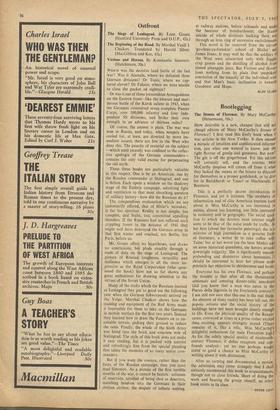Ostfront
The Siege of Leningrad. By Leon Goure. (Stanford University Press. and O.U.P., 42s.) Victims and Heroes. By Konstantin Simonov. (Hutchinson, 30s.) WHICH was the decisive land battle of the last war? Was it Alamein, .where We defeated three German divisions? Or Tunis, where we cap- tured eleven? Or Falaise, where we were unable to close the pocket on eighteen?
Or was it one of those tremendous Armageddons on the Eastern front—like the Obscure and mur- derous battle of the Ktirsk salient in 1943, when the Germans committed seven complete Panzer Corps, over 100,000 infantry and four inde- pendent SS divisions, and broke their own strength in an advance of thirteen miles?
Of course, the answer is plain. The war was won in Russia, and today, when tempers have cooled (or, at least, are diverted by more im- mediate issues), there are few in the West who deny this. The paucity of material on the subject —which until recently was confined to the collec- tive apologia of the German commanders— remains the only valid excuse for perpetuating the old myth.
These three books are particularly valuable in this respect. One is by an American, one by the Russian commander at Stalingrad, and one is fiction. Each opens a window on the shadowy stage of the Eastern campaign, admitting light and ventilation to that most absorbing question of military history—how did the Russians do it?
The compendious explanation which we are 'customarily offered, that of Hitler's 'mistakes,' is far too specious. Reality is not simple, but complex, and Stalin, .too, committed appalling blunders. If the Russians had not suffered such crippling losses in the autumn of 1941 they might well have destroyed the German army in That first winter and reached, not Berlin, but Paris, before us.
Mr. Goure offers no hypotheses, and draws no conclusions, but plods steadily• through a mass of data on tie • siege of Leningrad. The picture of Russian toughness, versatility and resilience which emerges is all the More im- pressive as the Rand Corporation (who spon- sored the book) have not so far shown any great enthusiasm for drawing attention to the virtues of the Soviet Union.
Many of the tricks which the Russians learned at Leningrad they put tá good use the following year when the German Schwerpunkt arrived on the Volga. Marshal Chuikov shows how the training and equipment of the Red Army made it impossible for them to take on the.Germans
in mobile warfare for the first two years. Instead they learned how to draw the Panzers on to un- suitable terrain, picking their ground to reduce the odds. Finally, the whole of the Sixth Army was lured into the brick and concrete web of Stalingrad. The style of this book does not make it easy reading, but it is packed with interest and refreshingly free from the special pleading that taints the memoirs of so many senior com-
manders. •
But if you want the essence, rather than the facts, 'of the Russian campaign, then you must read Simonov. As a picture of the first terrible months of the war, it cannot be beaten: columns of reservists, terrified of being shot as deserters, marching head-on into the Germans in their civilian clothes; the despair of infinite waiting,
at railway stations, before tribunals and under the hammer of bombardment; the frantic suicide of whole divisions hacking their, waY through an iron ring of successive encirclement& This novel is far removed from the curred 'go-clean-ya-foreskin' school of Mailer and James Jones. It may well be that the soldiers o the West were concerned only with fuggill crap games and the distilling of alcohol front tinned pineapple juice. But Victims and Heroes loses nothing from its plain (but unspoken) conviction of the tenacity of the individual sou), and that Man's basic inclination is towards Goodness and Hope.
ALAN CLARK






































 Previous page
Previous page